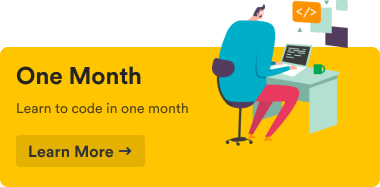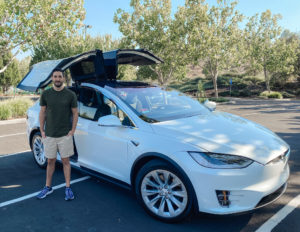The Best Way to Learn Python: Resources for Every Skill Level
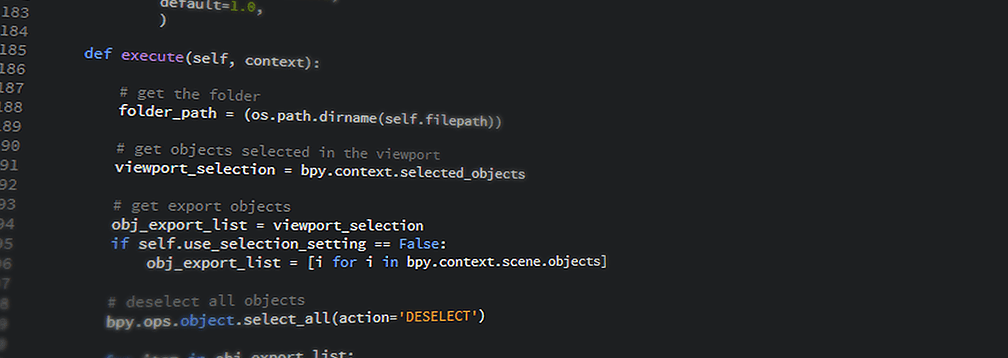
Python is one of the most versatile, powerful programming languages in the world. With Python, you can create games, design algorithms, or even program a robot. Learning Python can also lead to a career as a software engineer, web developer, mobile developer, or data scientist. It can also drastically improve your current career.
But before you can build a website or apply for a job at Google, you need to learn it first. So what’s the best way to learn Python? In this article, I will discuss the best book to learn Python, the best online Python course, the best tutorial, and the best bootcamp.
What is Python?
Python is a popular open-source programming language created by Guido Van Rossum in 1991. He named the language after the famous British comedy group Monty Python. Rossum’s critical insight was that programming languages are read more than they are written, so he set out to create an easy to read programming language.
Today, it is one of the fastest-growing programming languages in the world. One reason it is growing so fast is that it is popular in many different industries. Programmers use it for web development, data science, and more.
Python is known for having an active and passionate community. PyCon, a popular annual conference for Pythonistas, takes place in 42 countries. As an open-source language, the programming language itself is maintained by a passionate group of unpaid core developers.
Why learn Python?
There are several reasons you should learn Python. First of all, there is a huge demand for Python programmers. One reason is because of the rise of data science and machine learning. As you can see in the chart below, data scientists are one of the fastest-growing job positions in the United States.
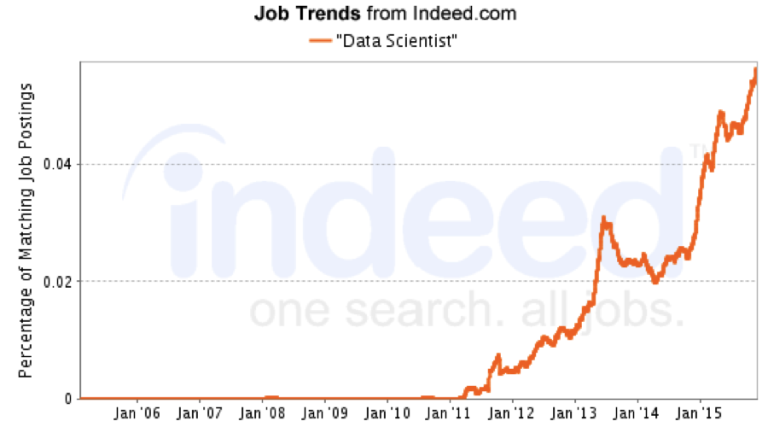
According to Glassdoor, the skills employers most frequently mention in data science job postings are Python, R, and SQL. The report went so far as to say that, “Nine out of 10 job postings examined require at least one of these skills, which are closely connected.”
Another reason it is growing so fast is that it is one of the best first programming languages for beginners. It is popular with beginners because it is easy to read and understand and because there is such a high demand for it in the market place.
Van Rossum agrees it is a great starting place to teach coding to beginners. He famously said, “Python is a lot easier than to teach to students programming and teach them C or C++ or Java at the same time because all the details of the languages are so much harder. Other scripting languages really don’t work very well there, either.”
My experience with Python
Python is the first programming language I learned, and it has played a significant role in my career. The first time I tried to learn to program was in college. Our professor taught us Java. I struggled to understand what was happening in the class, and eventually, I gave up.
When I graduated from college with a political science degree and struggled to get a job, I decided to learn to program. Luckily, my second time around, I decided to study Python. I found it much easier to learn, and I even secured a job as a Python developer at eBay in less than one year.
One of the reasons I got the job was because the person interviewing me was a Python enthusiast. We spent the majority of my interview talking about Python, and our mutual admiration for the language helped me get hired even though there were other more experienced candidates.
Today, when employers reach out to me, they are most interested in my Python skills. Here is an example of a message from a recruiter on LinkedIn asking me about my Python experience.
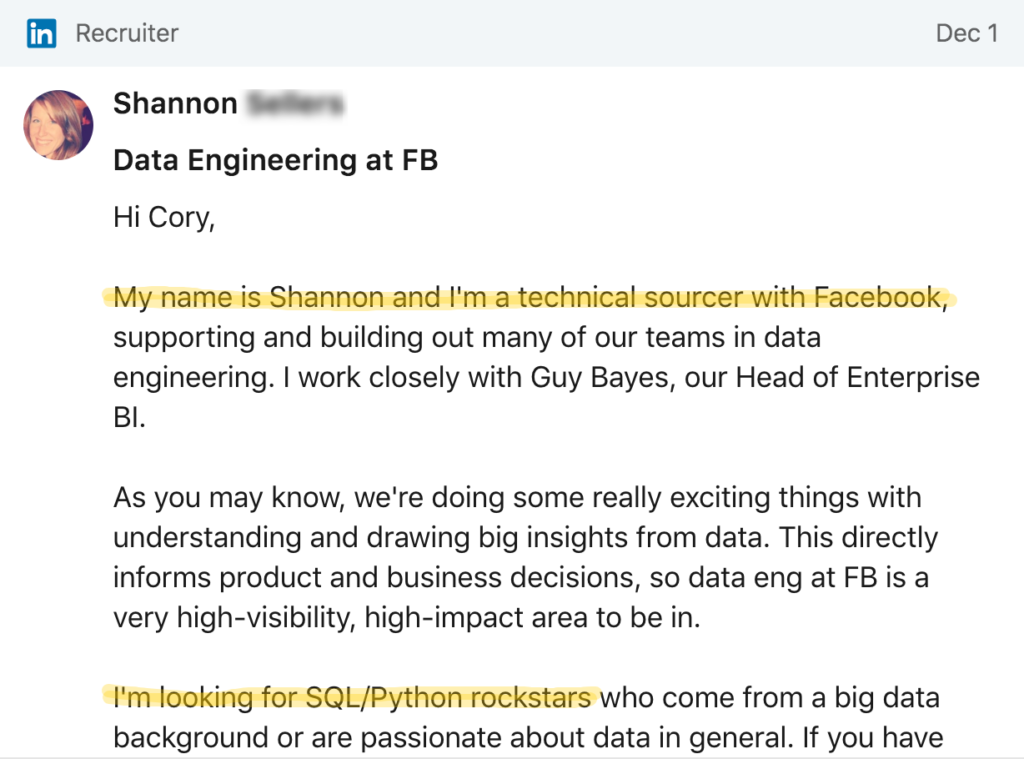
Things to Think About
Here’s the good news: people who want to learn Python have more resources than ever before. But that can also make it challenging to sift through the books, courses, video tutorials, and other resources.
And not everyone has the same learning style—a class that works for one person might not fit another. Before jumping into the best resources to learn Python, let’s talk about some key questions you should ask yourself first.
Don’t invest in books, courses, or boot camps until you can answer these three questions:
- Why do you want to learn Python?
- What’s your learning style?
- What’s your coding level?
Why Do You Want to Learn Python?
Start with your goal. Ask yourself, why do you want to learn it? Do you want to learn it because you want to change careers? Or because you have an idea for a great website that you want to create yourself? Do you want to add coding to your resume to get a job in an industry that hires people with programming skills?
Identifying your motivation gives you focus. It can also help narrow down the best resources to achieve your goals. For example, if you’re mainly interested in web development, you might not learn as much from a course about using it for data analysis.
If you just want to see if you like programming, you may want to start with a free Python course. If you are committed to going from a beginner to a professional programmer, you may want to investigate going to a boot camp.
What’s Your Learning Style?
After you’ve identified your goals, ask: What’s your learning style? Did you thrive in the structured format of school? Or do you love reading books to teach yourself skills on your own? Do you learn best when you interact with other students or by yourself?
Also, consider whether you prefer a teaching method that walks you through everything step-by-step or one that offers a more challenging approach. Knowing your learning style can help you find the types of programs that will help you be successful.
What’s Your Coding Level?
Now ask yourself: What’s your coding level? Do you already know another programming language, or are you completely new to coding? The best way to learn Python varies depending on your skill level.
If you’re entirely new, you might want to start with an introductory course or beginner’s book. If you already know Java or C++ and just want to add a new language to your list, you can start with a more advanced option. You might also prefer tutorials or structured projects over an online course format.
Remember: there’s nothing wrong with starting from scratch! Be honest about your coding skills so you can find the best method that works for your skill level.
Now that you’ve identified your goals, your learning style, and your coding level, you can find the best resource for your goals.
So let’s talk about some options for learning Python, including books, boot camps, online courses, tutorials, and structured projects.
Books
Books are one of the best and cheapest ways to learn Python. The first resource I ever picked up to learn to code was a book called Think Python. So what’s the best book to learn Python? I have several recommendations you will enjoy.
The Best Book to Learn Python (Beginner)
The Self-Taught Programmer
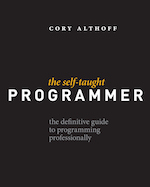
The first book up is my book The Self-Taught Programmer. I based it on my experience learning to program and landing a job as a software engineer at eBay. The Self-Taught Programmer doesn’t just teach Python—it also provides a roadmap for becoming a software engineer. It covers subjects like passing a technical interview and how to get a job in programming.
Python Crash Course
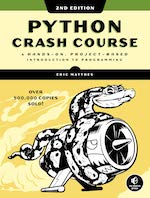
This bok takes a project-based approach. Python Crash Course introduces programming concepts, trains readers in testing code, and helps learners create their first projects. The projects focus on games and data analysis.
Learn Python the Hard Way
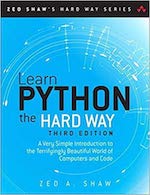
A challenging tutorial-based book by Zed A. Shaw, it throws readers into programming with 52 exercises. By completing the tasks, readers learn professional programming tricks and skills. The approach works best for those who like to figure things out on their own.
Automate the Boring Stuff with Python
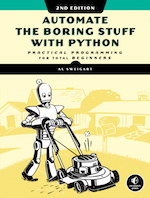
A great read, this book teaches you how to automate your daily tasks, like moving data from one spreadsheet to another. The book is aimed at new programmers. It is especially useful for anyone that wants to learn to program to automate their lives but isn’t necessarily looking to pursue software development as a career path.
Best Intermediate Python Books
Python Cookbook
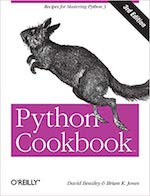
More a recipe book than a beginner’s guide, this book offers practical recipes for experienced programmers. The book includes code samples for designing algorithms, web programming, and more. If you already have experience programming, this is a great place to start.
Head First Python
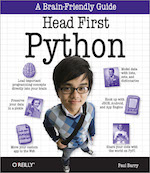
This popular programming book by Paul Berry covers all of the fundamentals. It also gets into some advanced topics like context managers, and generators. It is a worthwhile read if you already have some programming experience, but it is not the best first book to pick up as a new programmer.
Fluent Python
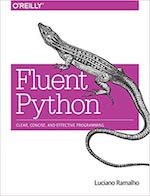
At 792 pages, this is not a short read. It does, however, go into everything you need to know about Python. From how to write great code, to metaprogramming, it covers it all. It is a great book to pick up if you are transitioning from another programming language.
Online Courses
I’ve used and still use online courses to learn more about programming all the time. Here are a few suggestions to help you find the best online Python course for you.
The Best Online Python Course
The Self-Taught Programmer Udemy Course
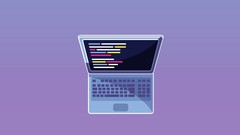
My goal with this course was to create the best online Python course possible. That is why I spent more than six months perfecting it and hired a professional narrator and animator. The course expands on my book and teaches you how to program, object-oriented programming, programming tools, computer science, how to land a job, and more.
Code Academy: Learn Python

Over 10,000 people have taken Code Academy’s Learn Python 3 course. With interactive exercises, beginner training, and an emphasis on takeaway skills, Codeacademy’s class is an excellent place for new coders to start and one of the best online Python courses.
Pluralsight
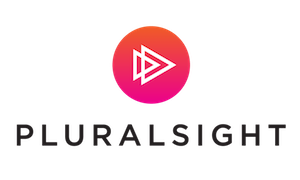
Pluralsight offers a wide range of programming courses: from beginner to expert. If you are already know how to program, Pluralsight is a great option for picking up new programming languages. Pluralsight is one of the top resources experienced programmers recommend. If you aren’t sure to start, consider Python Fundamentals by Austin Bingham.
Python for Entrepreneurs
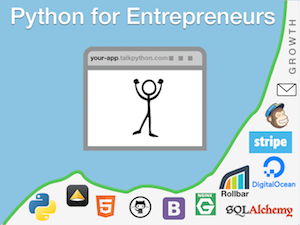
If you want to learn to program to start your own business, this is for you. This course helps entrepreneurs turn their visions into reality by learning to code. Python for Entrepreneurs requires basic programming knowledge and emphasizes coding for business.
If you want even a list of even more courses to learn Python, try using Coding List.
Tutorials
Sometimes even the best online Python course isn’t enough: you need tutorials to supplement your knowledge.
Best Python Video Tutorials
Python Tutorial for Beginners
This 6-hour long course has been viewed over 5 million times. It starts off with simple programs and gets to more advanced concepts like machine learning and web development. The video production is very high quality as well.
Python – Full Course for Beginners [Tutorial]
Although FreeCodeCamp is normally known for JavaScript, they do have a popular Python YouTube tutorial as well. The tutorial is 4 and a half hours long, and focuses on introducing you to the fundamental programming concepts you need to learn to become a programmer.
Best Python Tutorials and Structured Projects
Real Python
Real Python offers multiple tutorials on the Python programming language, with many geared toward web development. Tutorials cover Django and other popular web frameworks, providing critical skills for web developers. The site also offers content for beginners, intermediate developers, and experienced coders in other programming languages.
Python Jumpstart
A course that teaches Python by taking you through ten structured projects. Python Jumpstart appeals to people with some experience programming who want to add Python to their resume. With its focus on building projects, Python Jumpstart may work best for hands-on learners.
Dataquest
If your goal is to become a data scientist, Dataquest may be the perfect tool to get there. The program offers guides and tutorials to learn Python, work with data, and create projects.
Official Python Documentation
For advanced programmers looking to learn Python, your best option may be to read its official documentation. Python has a supportive and active community. They’ve done a fantastic job with easy to read, well-organized documentation.
Bootcamps
Boot camps are a much more expensive option. However, even though they are more expensive and a greater time commitment, the ones on this list get their student’s results. Here is my list of the best programming boot camps to learn Python.
Best Python Boot Camps
One Month Python

First up is One Month: is an online platform with real instructors that teaches you how to program in Python. Enrolling in the program gives you access to a supportive community of thousands of students all learning to code together. The program includes weekly live training. This blended approach works well for many different learning styles.
HackBright Academy
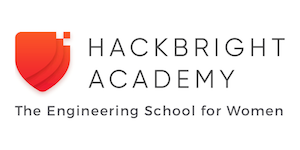
HackBright is a coding boot camp based in San Francisco, California. Their mission is to shrink the gender gap in technology, which is why the program is only available for women. HackBright focuses on teaching Python. They have partnerships with different tech companies, which is partially responsible for their 90% job placement rate.
Alchemy Code Lab
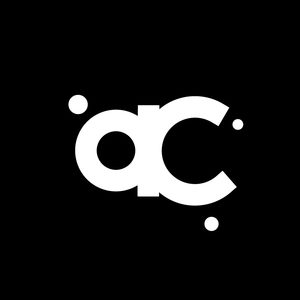
Alchemy Code Lab is located in Portland. Their boot camp specializes in training new programmers in Python. They pride themselves on having a high in-person staff to student ratio. Their programs last from 1 to 4 weeks.
Closing Thoughts
I hope this article helped you find the best book to learn Python, the best online Python course, or the perfect boot camp or tutorial.
These tools can help anyone, from a novice to an expert in coding, learn Python.
Keep in mind that the most effective way for you to learn Python depends on your learning style. Some people sit down with a book and teach themselves how to program.
That’s how Elon Musk learned to program. Others prefer the structure of an online course with regular meetings. Sometimes a blended format, with videos and live sessions, like that offered by One Month, works best.
Once you know your goal, your learning style, and your current coding level, you’re on the way to learning Python.
If you are looking for even more Python courses, check out Coding List: a tool that helps you find the best programming classes.


